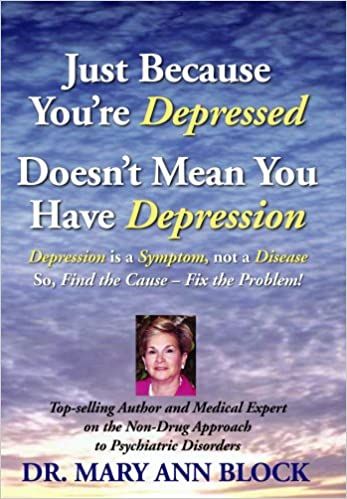Just Because You’re Depressed, Doesn’t Mean You Have Depression, Depression is a Symptom Not a Disease, So Find the Cause — Fix the Problem
In this book, Dr. Mary Ann Block uses a clear and easy to understand writing style to expose the truth about the diagnosis of depression, and the dangers of the current medications prescribed for it. If you or someone you love is among the 300 million people diagnosed with or suffering from the symptoms of depression, the information from this book could literally save your life. In the book, Block examines the often flawed area of psychiatry with a fine-tooth comb, to help people understand the real issues underlying their symptoms. Having the right information then allows you to make an educated decision.
Block’s book outlines the six most common causes of depression that she has seen among her patients. They are as follows:
- Thyroid Problems
- Hormone Deficiencies
- Magnesium and Other Nutritional Deficiencies
- Allergies
- Prescription Drug Side-Effects
- A Personal Loss or Other Normal Life Cycle Experience
Other important points covered in Block’s book include:
- Postpartum depression, and how it is a hormonal imbalance, not something that requires treatment with anti-depressants.
- How poor nutrition can impact your mood and lead to symptoms of depression.
Block also reviews the many side effects of anti-depressants, which include depression, heart failure, heart attack, atrial fibrillation, cerebral embolism, stroke, shock, thrombosis, ventricular arrythmia, venticular fibrillation, hemorrhage, coma, delusions, abnormal EEG, hypertension, angina pectoris, agitation, sleep disorder, apathy, ataxia, hallucinations, hostility, paranoid reactions, personality disorder, psychosis, vertigo, antisocial behavior and stupor.
About the Author
Dr. Mary Ann Block is a top-selling author on family health, and director of the Block Center. Her medical approach is to look for and treat, whenever possible, the underlying causes of the problem, instead of using drugs to cover the symptoms. Her other books include No More ADHD, No More Ritalin, Today I Will Not Die, and The ABC’s of Raising Great Kids.
Dr. Block chairs The Health and Empowerment Committee for the National Foundation of Women Legislators. She is a State of Texas Family Practice Preceptor and served on the faculty as assistant professor at the University of North Texas Health Science Center/Texas College of Osteopathic Medicine in Fort Worth, Texas. Dr. Block is a regular contributor on TBN and FamilyNet’s Your Health with Dr. Richard Becker, as well as being quoted in magazines, newspapers, radio and TV shows across the country.
Reviews
David Brown Stein, M.D., author of Overcoming Thyroid Disorders and Drugs That Don’t Work, and Natural Therapies That Do
“This book is a must read for those who have been diagnosed with depression. This book gives the reader all the information they need to make the best choices about how to find the real cause of their symptoms. I highly recommend this book by Dr. Mary Ann Block.”



